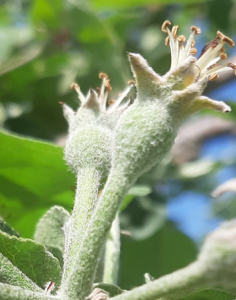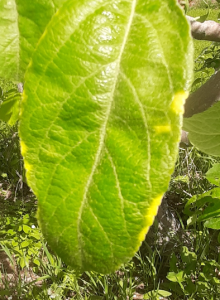Tree Fruit Newsletter — May 29, 2024
In this newsletter:
- Chemical Thinning at Early Fruit Set
- Observations

Chemical Thinning at Early Fruit Set
King fruit diameter is averaging 7 mm for McIntosh and Cortland, and 6 mm for Honeycrisp at Highmoor Farm. Based on the signs of initial fruit set on Macs, my guess is that we need to thin more aggressively than usual, but we still have a few days to see how much fruit set has occurred. There were a few spots in the orchard with many unpollinated flowers dropping, so I suggest checking each block to see if this is happening in your orchards. Photo 1 shows what fruit set looks like.
The next period of favorable temperatures will begin Friday, and this will be followed by predicted highs near 80 °F. Applying thinners during this warm spell will likely result in good thinning. Fruitlets will also be approaching the 10-12 mm stage when they are more easily thinned. Adjust the rate according to the variety. Macs and Cortlands are considered easy to thin. Honeycrisp, Gala, Empire and most other varieties are moderately difficult to thin. Golden Delicious is very difficult to thin and should get the highest rates of thinner. Less is known about the newer varieties such as Evercrisp, but the Midwest Apple improvement Association has a website with some instructions on thinning their varieties: Growers Tips – Midwest Apple Improvement Association (maiaapples.com).
Observations

Some minor phytotoxicity is showing up in Highmoor Farm orchard blocks. This is most likely from the streptomycin sprays for fire blight. See photo 2.
Also noted, was some very late bloom on Gala which could become infected with fire blight if conditions are right for infection. If you see these flower clusters at the tips of new shoots, make a note of it and check these blocks first for signs of fire blight as the season progresses.
Peaches are at the ‘shuck spit’ stage when chlorothalonil fungicide should not be used anymore because of potential fruit burning. It’s also the time when plums become sensitive to captan. Avoid spraying captan in hot weather on plums.
Renae Moran
UMaine Cooperative Extension Tree Fruits Program
University of Maine Cooperative Extension
PO Box 179
Monmouth, ME 04259
(207) 933-2100
rmoran@maine.edu
Mention of a trademark, proprietary product, or vendor does not constitute a guarantee or warranty of the product, nor does it imply approval or disapproval to the exclusion of other products or vendors that may also be suitable.
In complying with the letter and spirit of applicable laws and pursuing its own goals of diversity, the University of Maine System does not discriminate on the grounds of race, color, religion, sex, sexual orientation, transgender status, gender, gender identity or expression, ethnicity, national origin, citizenship status, familial status, ancestry, age, disability physical or mental, genetic information, or veterans or military status in employment, education, and all other programs and activities. The University provides reasonable accommodations to qualified individuals with disabilities upon request. The following person has been designated to handle inquiries regarding non-discrimination policies: Director of Equal Opportunity, 5713 Chadbourne Hall, Room 412, University of Maine, Orono, ME 04469-5754, 207.581.1226, TTY 711 (Maine Relay System).
